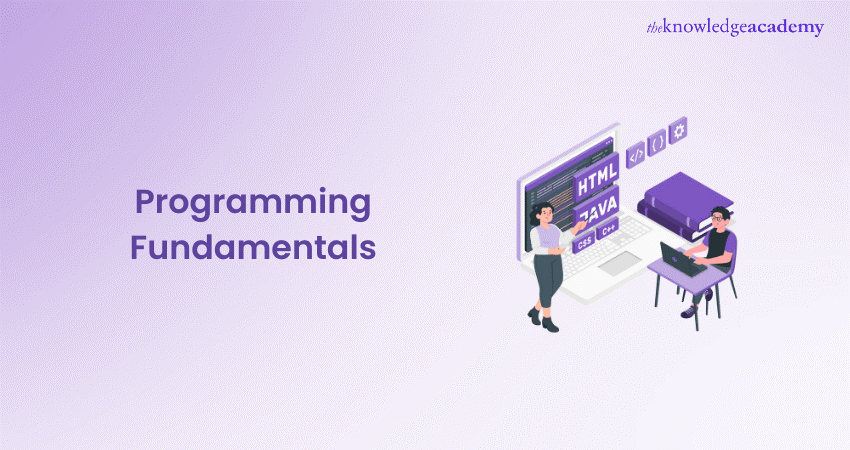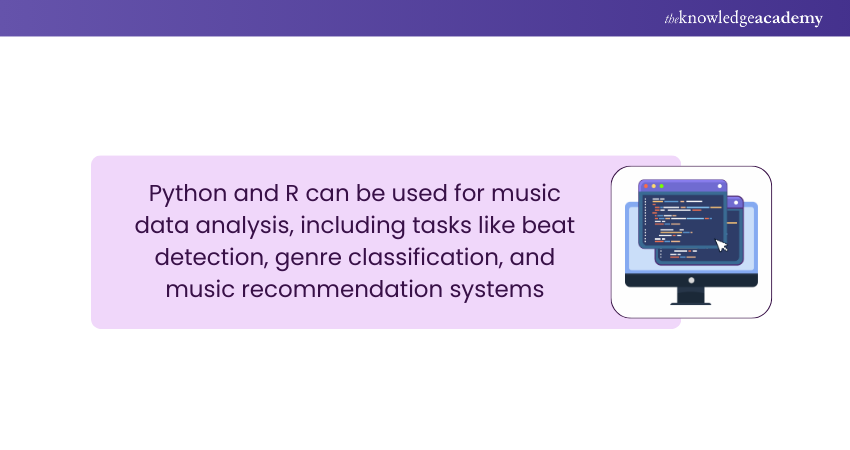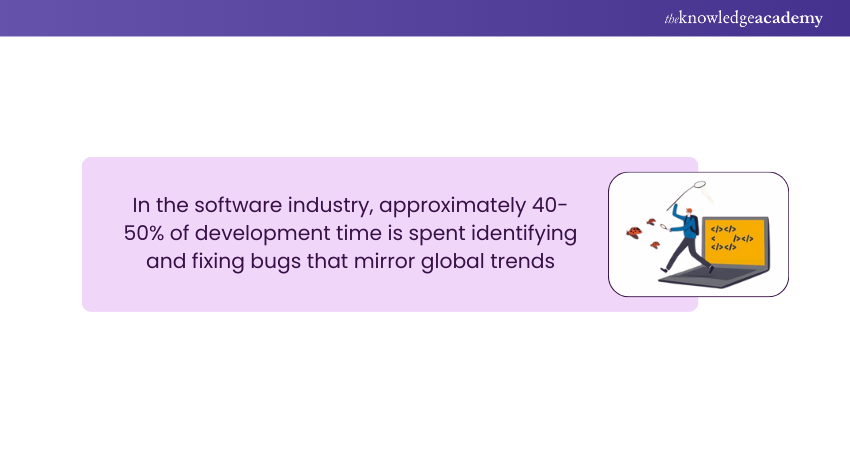We may not have the course you’re looking for. If you enquire or give us a call on + 1-866 272 8822 and speak to our training experts, we may still be able to help with your training requirements.
We ensure quality, budget-alignment, and timely delivery by our expert instructors.

Ever wondered what breathes life into the machines we interact with on a daily basis? The answer lies in the vibrant world of Programming Languages. This is where cold, hard logic meets creativity in transforming abstract concepts into tangible applications. Having a firm grasp of Programming Fundamentals is your gateway to turning basic ideas into functional software. From data structures and debugging to IDEs, this blog takes you through the fundamentals of programming, providing you with the ideal tools to kickstart your coding journey confidently. So, dive in!
Table of Contents
1) What are the Programming Fundamentals?
2) Fundamental Programming Concepts
a) Data Structures
b) Variable Declaration
c) Debugging
d) Object Oriented Programming
e) Control Structures
f) Basic Syntax
g) DEs and Coding Environments
3) Tips to improve programming skills
4) Conclusion
What are the Programming Fundamentals?
Programming Fundamentals are the bedrock on which the towering structures of code are built, much like a blueprint for mastering the language of computers. Think of them as the ABCs of the digital realm, guiding aspiring coders through a maze of syntax and logic.
At their core, programming basics cover essential concepts and principles that create the framework for Software Development. From understanding variables and data types to mastering loops and conditionals, these fundamentals provide the groundwork for crafting elegant algorithms and robust applications.
Imagine Programming Fundamentals as the keys to a musical masterpiece. They are the building blocks of harmony and melody that transform a cacophony of code into a symphony of functionality. These basics empower programmers to skillfully wield the tools of their trade, allowing them to turn abstract ideas into tangible solutions that sculpt the digital landscape.
Mastering Programming Fundamentals is akin to learning the language of technology—a journey of discovery and innovation that unlocks endless possibilities in the ever-evolving world of software engineering.
Fundamental Programming Concepts
Programming is the foundation for constructing a grand architectural marvel, much like laying a sturdy foundation before building soaring towers of innovation. Fundamental programming concepts guide coders through the complex maze of code and creativity, establishing the groundwork necessary for all programming endeavours.

1) Data Structures
A Data Structure provides an effective way to store and retrieve data. Computer programmers can use various data structures to complete tasks and run applications. These are some common data structures used in software development:
a) Arrays: Arrays organise data by storing similar elements and allocating contiguous memory.
b) Stacks: Stacks are linear structures that follow a last-in, first-out (LIFO) order for executing operations.
c) Queues: The queue follows a first-in, first-out (FIFO) order for executing operations.
d) Linked lists: Linked lists use pointers instead of contiguous memory locations to link elements and they implement stacks, queues, and graphs.
e) Binary trees: Binary trees are non-linear structures containing nodes with two possible values or directions.
f) Graphs: Graphs contain nodes and edges connected to one another, used to study maps, and social media networks.
2) Variable Declaration
Variables are containers for storing values, and the variable declaration indicates that the OS will reserve memory with that variable name. A variable can be defined with digits, alphabets, and underscores. Variable names can start with an alphabet or an underscore but cannot begin with a digit. Some variable types across several programming languages are:
a) Constant variable: You can use constant variables to store data whose value doesn't change throughout the program.
b) Global variable: You can declare global variables outside a function.
c) Class variable: You can access class variables within a specified class.
d) Instance variable: You can declare instance variables inside a class but outside a method.
e) Local variable: You can declare local variables in classes, methods, or instances.
Want to master the skills needed to deal with Big Data? Sign up for our comprehensive MapReduce Programming Model Training now!
3) Debugging
Debugging removes errors from computer programs and enables software development and engineering teams to produce functioning software. Through debugging they can examine individual code sections to ensure the program works as intended. Below is a list of potential programming errors:
a) Syntax Error: This is an erroneous sequence of characters or tokens in the code that doesn't follow the syntax of a programming language.
b) Logical Errors: These occur when a flaw in the algorithm or logic of the code halts the program's execution or returns a wrong output.
c) Latent Errors: Also known as hidden errors, arise when you use a specific set of data as input to the program and forget to account for an outlier or edge case.

4) Object Oriented Programming
Object-Oriented Programming (OOP) is a programming paradigm centered around objects that store data and exhibit behaviour. It's akin to organising a toolkit where each tool, or object, has specific functions and properties. There are four principles of OOP:
a) Inheritance
b) Polymorphism
c) Abstraction
d) Encapsulation
OOP promotes modularity, reusability, and scalability by enabling programmers to create classes, which are blueprints for objects. These classes define relationships through mechanisms like inheritance and polymorphism, making it easier to manage complex software systems.
For example, in game development, OOP allows for the creation of distinct classes such as "Player" and "Enemy." These classes might inherit from a broader "Character" class, sharing common traits while also introducing specific attributes and actions.
Grasping OOP is essential for developing sophisticated software applications as it fosters well-organized, abstracted, and maintainable code. By applying OOP principles, programmers can craft elegant, scalable, and adaptable solutions that effectively model real-world entities and their interactions. This makes OOP a fundamental skill for those looking to build advanced, efficient software systems.
Elevate your coding game with our D Programming Language Training – master a modern, efficient language and unleash your Software Development potential today!
5) Control Structures
Control structures are workflows created by programmers that allow a program to take one direction or another, helping the computer understand where to go next. For example, when a computer program runs, the computer reads the code a line at a time, eventually reaching a point where it needs to make a decision based on strict parameters set by the programmer.
The code could do things like re-run a certain piece of code again, jump to a different part of the program, or skip a block of code altogether.
6) Basic Syntax
Basic syntax in programming is akin to the grammar and punctuation rules used in written language, dictating the structure and composition of code within a specific programming language. It involves elements like keywords, operators, variables, and punctuation marks, which are used to form statements and expressions.
For instance, in the Python programming language, indentation is crucial for indicating code blocks, and semicolons are typically used to end statements. Understanding basic syntax is vital for writing correct and readable code, as it governs how the computer interprets and executes instructions. By adhering to these syntax rules, programmers can effectively communicate their intentions, ensuring their code operates as expected.
7) IDEs and Coding Environments
Integrated Development Environment (IDE) is an application programmers use to write code and organise text groups. It increases a programmer’s productivity and efficiency through features such as code compilation, code completion, debugging, syntax highlighting, etc.
Some common examples of IDE’s are:
a) AWS Cloud9
b) Visual Studio
c) NetBeans
d) Eclipse
On the other hand, coding environments might offer a more lightweight and customisable setup, allowing programmers to select specific tools and configurations that best fit their preferences and the requirements of their projects, showcasing the Benefits of Coding through enhanced efficiency and flexibility.
Embark on a journey to Ruby mastery – join our comprehensive Ruby Programming Course and unleash your potential as a dynamic Software Developer!
Tips to Improve Programming Skills
Here are some tips to improve your programming skills:
1) Take Additional Courses: Consider taking additional courses including practice tests, quizzes, and capstone projects to enhance your programming skills and credentials in the IT field.
2) View Source Code: It's highly recommended that you review the modules' source code for deeper insight into their design structure and implementation procedure. This will guide you in designing your own custom module for a program.
3) Work on Mini-projects: By working on end-to-end projects, you learn the overall structure of a program, along with best coding practices and optimisation techniques. A project involves various phases, such as data collection, analysis, algorithm development, code testing, and deployment.
4) Participate in Coding Competitions: Competitive coding can elevate your algorithmic skills and problem-solving abilities by helping you learn more about data structures and discrete mathematics.
5) Follow Other Programmers: You can review their codebases on various platforms, such as Kaggle or GitHub, letting you improve your programming skills and stay current with the latest IT developments.
Get ahead of the competition with expert guidance on Software developer interview questions. Your dream job is just one great interview away!
Conclusion
As we conclude our journey through the Programming Fundamentals, remember that each of these concepts is a steppingstone to greater innovation. Embrace these principles, practice diligently, and watch as your code brings your dream application to life. The world of programming awaits your unique contribution, so make sure you make your mark!
Level up your coding skills and your web development expertise with our comprehensive Python Course – Sign up now!
Frequently Asked Questions
Why do We Need Programming Fundamentals?

Programming Fundamentals are crucial for grasping the core concepts and techniques of coding, facilitating effective problem-solving and Software Development. They serve as the building blocks for mastering various programming languages and technologies.
What are the Basic Programming Languages I Should Learn for a Career in Software Development?

For a career in Software Development, you must consider the following Programming Languages:
a) Python
b) Java
c) C++
d) SQL
e) Ruby
f) Swift
What are the Other Resources and Offers Provided by The Knowledge Academy?

The Knowledge Academy takes global learning to new heights, offering over 3,000 online courses across 490+ locations in 190+ countries. This expansive reach ensures accessibility and convenience for learners worldwide.
Alongside our diverse Online Course Catalogue, encompassing 19 major categories, we go the extra mile by providing a plethora of free educational Online Resources like News updates, Blogs, videos, webinars, and interview questions. Tailoring learning experiences further, professionals can maximise value with customisable Course Bundles of TKA.
What is The Knowledge Pass, and How Does it Work?

The Knowledge Academy’s Knowledge Pass, a prepaid voucher, adds another layer of flexibility, allowing course bookings over a 12-month period. Join us on a journey where education knows no bounds.
What are the Related Courses and Blogs Provided by The Knowledge Academy?

The Knowledge Academy offers various Programming Courses, including the M Python Programming Course, Visual Basic Course, and Object-Oriented Programming (OOPs) Course. These courses cater to different skill levels, providing comprehensive insights into Advantages of Object-Oriented Programming (OOP).
Our Programming & DevOps Blogs cover a range of topics related to Programming Fundamentals, offering valuable resources, best practices, and industry insights. Whether you are a beginner or looking to advance your Programming skills, The Knowledge Academy's diverse courses and informative blogs have got you covered.
Upcoming Programming & DevOps Resources Batches & Dates
Date
 Object Oriented Programming (OOPs) Course
Object Oriented Programming (OOPs) Course
Fri 21st Mar 2025
Fri 2nd May 2025
Fri 29th Aug 2025
Fri 3rd Oct 2025
Fri 5th Dec 2025






 Top Rated Course
Top Rated Course



 If you wish to make any changes to your course, please
If you wish to make any changes to your course, please


